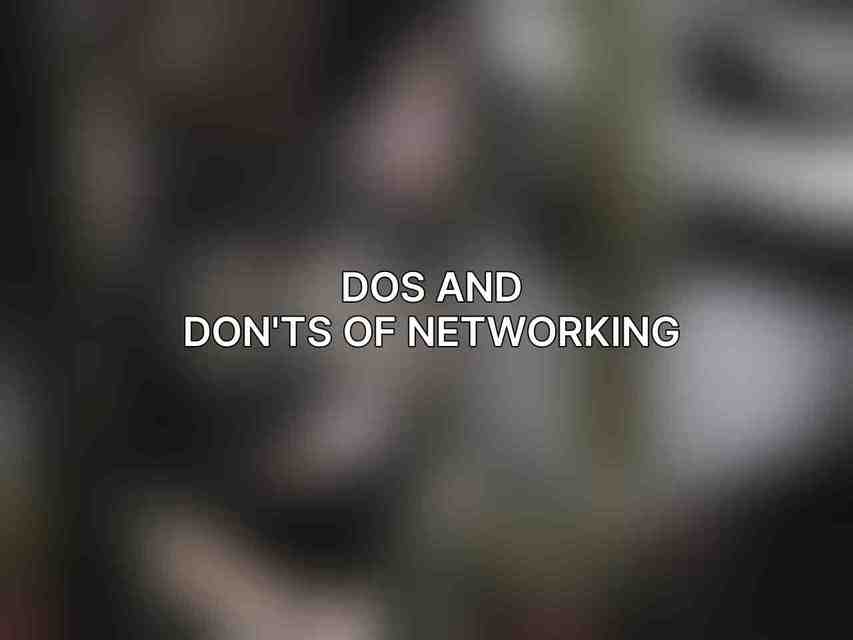Networking is a fundamental aspect of career growth in this professional world. It involves building and nurturing relationships with individuals who can offer support, guidance, and opportunities for advancement. The significance of networking lies not only in the connections made but also in the exchange of knowledge, ideas, and resources that can propel one’s career forward.
Benefits of Networking for Career Advancement

Access to Hidden Job Opportunities: Through networking, individuals can tap into the hidden job market where positions are filled through referrals and connections, rather than traditional job postings.
Industry Knowledge and Market Insights: Interacting with professionals in your field provides valuable insights into industry trends, challenges, and opportunities, giving you a competitive edge.
Mentorship and Career Guidance: Networking allows for the establishment of mentoring relationships with experienced professionals who can offer valuable advice and guidance for career progression. Explore further with Essential Networking Strategies for Professionals Starting Out
Enhanced Credibility and Reputation: Building a strong professional network enhances your credibility within your industry and can lead to increased opportunities for career growth and advancement.
Creating a Valuable Network
Identify Your Target Network
To build a valuable network, it is essential to identify and connect with the right individuals:
Industry Professionals: Connect with professionals in your field who can offer insights, advice, and potential career opportunities.
Alumni: Alumni networks can provide a strong foundation for networking and offer a sense of camaraderie and shared experiences.
Professional Organizations: Joining industry-specific organizations allows for networking opportunities with like-minded professionals.
Building Meaningful Connections
Building a strong network requires proactive steps:
Attend Industry Events and Conferences: These events provide opportunities to meet industry leaders and like-minded professionals in a networking-friendly environment.
Join Online Networking Platforms: Platforms like LinkedIn and Meetup offer virtual networking opportunities to connect with professionals globally.
Reach Out to Key Individuals: Don’t hesitate to reach out to individuals you admire or who hold positions you aspire to, and express your interest in connecting.
Nurturing Relationships
Sustaining connections is crucial for long-term networking success:
Provide Value and Offer Support: Offer assistance, share insights, and be helpful to your network to cultivate strong, mutually beneficial relationships.
Stay Engaged through Regular Communication: Maintain regular contact with your network through emails, calls, or in-person meetings to stay top-of-mind.
Be a Good Listener and Show Empathy: Listen attentively to your connections, show genuine interest, and offer support where needed to build trust and rapport.
Networking Strategies for Career Advancement
Informational Interviews
Informational interviews are a powerful networking tool:
Identify Potential Mentors: Look for individuals whose career paths or expertise you admire and seek informational interviews to learn from their experiences.
Prepare and Conduct Informational Interviews: Before the interview, research the individual and prepare relevant questions to make the most of the opportunity.
Seek Insights and Build Relationships: Use the informational interview to gather insights, advice, and potentially establish a mentoring relationship for ongoing support and guidance.
Mentoring and Sponsorship
Mentors and sponsors play pivotal roles in career development:
Types of Mentors and Sponsors: Identify mentors who can offer guidance and sponsors who advocate for your career advancement.
Building a Mentoring Relationship: Invest time in nurturing the mentoring relationship, seeking advice, and acting on feedback to grow professionally.
Benefits of Mentorship and Sponsorship: Mentorship and sponsorship can accelerate career growth, provide valuable insights, and open doors to new opportunities.
Referral Generation
Utilizing referrals for career advancement:
Asking for Referrals Professionally: When seeking opportunities, don’t hesitate to ask your network for referrals, keeping the request professional and courteous.
Providing Value in Exchange for Referrals: Offer reciprocal support or assistance to those who provide referrals, creating a culture of mutual benefit.
Tracking and Managing Referrals: Keep track of referrals received and follow up on them promptly, showcasing your appreciation and professionalism.
Maintaining and Growing Your Network
Sustaining and expanding your network is essential for ongoing career success:
Attend Industry Events Regularly: Regular participation in industry events keeps you connected, informed, and visible within your professional community. Check this blog on How to Master Online Networking: The Ultimate Guide
Engage in Online Networking: Active engagement on platforms like LinkedIn, where you can share insights, participate in discussions, and showcase your expertise, is crucial.
Nurture Relationships with Key Contacts: Prioritize relationships with key contacts by staying in touch, offering support, and seeking collaboration opportunities.
Leverage Technology for Networking: Use Customer Relationship Management (CRM) tools and LinkedIn to manage and expand your network effectively.
Dos and Don’ts of Networking

Dos
Be Yourself and Be Authentic: Authenticity builds trust and fosters genuine connections in networking interactions.
Prepare and Practice Your Introductions: Have a concise and engaging introduction prepared to make a positive first impression.
Listen Actively and Ask Insightful Questions: Show genuine interest in others by actively listening and asking thoughtful questions that demonstrate your engagement.
Don’ts
Be Pushy or Self-Promotional: Avoid approaching networking opportunities with a self-serving agenda; instead, focus on building relationships organically.
Neglect to Follow Up: Always follow up after networking interactions to express gratitude, continue the conversation, or explore potential collaborations.
Burn Bridges with Negative Networking: Maintain professionalism and positivity in networking interactions to avoid damaging relationships or reputation.
Networking is a dynamic and continuous process that requires effort, authenticity, and a strategic approach to yield fruitful results in career advancement. By leveraging your network effectively, you can unlock new opportunities, gain valuable insights, and foster meaningful relationships that contribute to your long-term professional growth and success.
Frequently Asked Questions
What are some key strategies to leverage your network for career growth?
Some key strategies to leverage your network for career growth include building relationships with colleagues and industry professionals, attending networking events, engaging in informational interviews, and offering value to your connections.
Why is networking important for career growth?
Networking is important for career growth because it can help you gain access to new opportunities, learn about industry trends, receive valuable advice and guidance from experienced professionals, and expand your knowledge and skills. Networking also allows you to build a strong professional reputation and increase your visibility in your industry.
How can I effectively expand my professional network?
You can effectively expand your professional network by attending industry conferences, joining professional organizations, utilizing social media platforms such as LinkedIn, and participating in industry-related webinars and workshops. It’s also important to regularly follow up with your connections and maintain strong relationships with them.
What are some common networking mistakes to avoid?
Some common networking mistakes to avoid include being too self-centered in conversations, failing to follow up with contacts after initial meetings, only reaching out to your network when you need something, and not offering any value to your connections. It’s important to approach networking with a genuine interest in building mutually beneficial relationships.
How can I make the most out of my networking efforts?
To make the most out of your networking efforts, it’s important to set specific goals for your networking activities, be proactive in reaching out to new contacts, prioritize building authentic relationships over simply collecting business cards, and consistently add value to your network by offering assistance, advice, or resources whenever possible.

